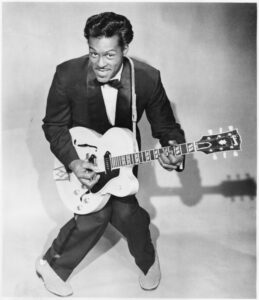
Chuck Berry’s greatest fame came as a rock ‘n’ pioneer, but his blues roots go deep. Born October 18, 1926, in St. Louis, Berry combined blues, country, and boogie-woogie with a lyrical flair keenly attuned to the heartbeat and habits of teenage America in the 1950s. Berry acknowledged T-Bone Walker as a major influence on his guitar style, as well as Louis Jordan’s guitarist Carl Hogan, whose 1946 riff on Jordan’s Ain’t That Just Like a Woman, was made famous by Berry in the intro to Johnny B. Goode. Berry was sent to a reformatory in Jefferson City, Missouri, after getting arrested during a joy ride to Kansas City in 1944, and while doing his time he also picked up some pointers from a Kansas City guitarist, Sam Alexander (referred to in Berry’s biography only as Po’ Sam).
Berry played in the blues clubs of East St. Louis in the early ’50s, trying out not only the blues of Muddy Waters on his black audiences but also some country. On a trip to Chicago in 1955, he looked up Muddy, who suggested he approach Chess Records about recording, and the result was Maybellene (a rocked-up version of an on old country song, Ida Red). The flip side, which made some noise on the R&B charts, was a straight blues, Wee Wee Hours – one of many Berry would record over the years, including Confessin’ the Blues, Merry Christmas Baby, Worried Life Blues, Dust My Broom, Don’t You Lie to Me, Driftin’ Blues, The Things I Used to Do, and St. Louis Blues. Sidemen on the Chess sessions included such blues notables as Willie Dixon, Lafayette Leake, Fred Below, Hubert Sumlin, Odie Payne, and Matt Murphy – and even Paul Butterfield and Mike Bloomfield on one session – in addition to the St. Louis pianist who helped shape the Berry sound, Johnnie Johnson.
– Jim O’Neal
Chuck Berry was inducted into the Blues Hall of Fame in 1985.
